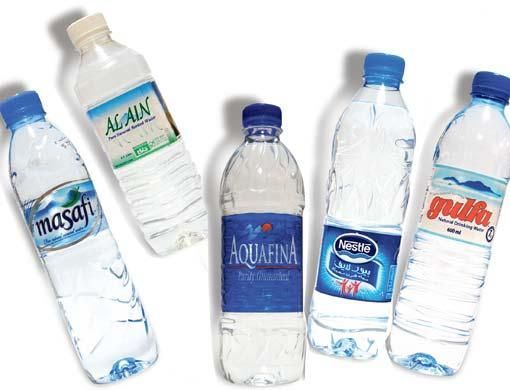Bottled water comes from two sources. The natural sources, such as mountains and springs, count for a small percentage of the origin and the rest is desalinated water.
Nestle purelife
"In the UAE purelife water is either imported from Saudi Arabia or bottled here. In Saudi it has two sources - a deep well or treated water. In the UAE it is treated water, which means purified water that is re-mineralised. The label is marked Bottled Drinking Water and we don't place images of mountains. It reflects the reality," said Elias Fayad, sales and marketing regional director of Middle East and Africa.
"We have many products across Africa and the Middle East. Our water in Turkey, Erikili comes from a natural spring from the mountains so we have a mountain on the label. In Egypt, the water Baraka comes from a deep well and it also says so on the label," he added.
Aquafina pure drinking water
There are two wells on the plant premises from which water is pumped. Raw water is stored in tanks before filtration begins. Dibba Municipality recently issued a statement confirming that the source of Aquafina water is natural and underground.
"It is not mineral water, it is purified water bottled on the line," said Hassan Safa, Dibba branch manager. He said the plant is not even linked to the municipality water line.
"Underground water is available so we are situated here. Even the water in our toilets is from the wells," he added. After reverse osmosis salts and minerals provided by Pepsico International are injected in the water. The plant fills 15,000 1.5 litre bottles per hour.
Masafi mineral water
Masafi water is sourced from the village Masafi in Ras Al Khaimah. The water is pumped from a number of wells at different depths and times so the water does not always come from the same wells and are blended. The wells also have water with a different TDS.
"I agree that based on FDA rules mineral water should contain at least 250ppm of TDS, but as we draw water from different wells there is compensation and we balance the TDS to 130ppm," said Ray Avila, Quality Insurance Manager.
As a raw water Masafi goes through a multi-barrier filtration system, a sand filter and a carbon filter to handle the off-taste and colour the water may have. It goes through a submicro filter for contamination and finally ozonation which sterilises it in the bottle. The plant fills 28,000 1.5 litre bottles per hour.
Al Ain mineral water
Al Ain Mineral Water used to draw water from deep wells located on the factory premises since 1990 but stopped in 2005 due to the lack of natural replenishment of the source and declining yield. In 2005, new guidelines where introduced on the bottled water manufacture which limited the TDS levels of bottled water for human consumption to a maximum of 500mg/ml.
There is also a limit on acceptable Bromate levels which were not to exceed 10 parts per billion (ppb). The company now sources its water from the Al Ain Distribution Company. This water is then purified in accordance to the Abu Dhabi Food Authority guidelines and standards.
Water passes through a reverse osmosis water treatment process to reduce the high, naturally occurring TDS levels in well water to levels fit for proper human consumption. Approximately 45,000 bottles are filled per hour across 5 lines.
Gulfa
According to Essam Amer, Gulfa Factory Manager the source is located in Wadi Gulfa in Masfout close to Hatta. "It is named after the wadi. The factory is inside the mountains. We are 5 kilometres from the main road. We take our water from three main wells which are 300 metres deep. Our wells have a large capacity of water and we have never had any shortages or affected the local population.
We do not mix our water or buy it from the municipality. We have enough for our production which is limited but we do not blend it. The TDS in the well is between 120 and 130. There are no gardens or agriculture near the wadi so the water is very pure. It is filtered and purified according to official standards and we have checks regularly. They don't tell us when they are coming." The plant fills 24,000 1.5 litre bottles per hour.












